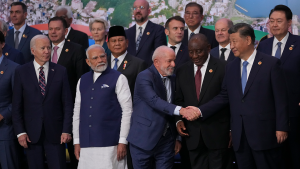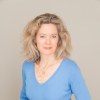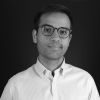1,000 Days of Ukraine War, Global Summits, and RFK Impact on Global Health
 Play Video
Play Video
About This Episode
This week marked the 1,000 day of the Ukraine War. We'll unpack recent developments, including Ukraine's use of US-supplied ATACMS missiles to strike Russian territory for the first time, intensified Russian attacks near Kurakhove, the pause in operations at the US embassy in Kyiv, and Russia's updated nuclear deterrence doctrine. Then world leaders met this week in Azerbaijan for the UN Climate Summit, Peru for the APEC Summit, and in Brazil for the G20. How did Trump's victory affect the dynamics of these meetings, with Biden already fading into the background and Xi being front and center? We'll also talk about Trump's pick of RFK for US health secretary and the possible impact on global health and pandemic prevention. Stefanie Bolzen, Prashant Rao, and Andrew Roth join Ivo Daalder to discuss these topics and more on this week's World Review.
While we encourage you to watch or listen to the episode (and subscribe wherever you get your podcasts!), these are Ivo's top takeaways from today's discussion:
- We looked first at Ukraine – where missiles were flying around the country and, for the first time, into Russia. Early this week, President Biden authorized Ukraine to use American Atacms against targets in Russia. Britain followed suit the next day, allowing Ukraine to shoot Storm Shadow missiles into Russia. Moscow wasn’t pleased. Putin signed a formal decree first announced in September to lower the threshold for using nuclear weapons and then struck a target with a new long-range missile. The missile war has rattled nerves, especially in Europe. The risk of further escalation in war is always there. But, as Andrew argued, Putin seemed well aware of the risks. Moscow warned Washington that it was using the new missile, and the military impact of its use was minimal. Its purpose was to send a signal about Russia’s unease. Its main addressee wasn’t in Kyiv, but most likely in Mar-a-Lago. President-elect Trump has said he will seek to end the war in one day. Sending a clear sign that the war may be getting out of hand could be Putin telling Trump he better get on without. Although what price Moscow will try to exact for ending the war remains to be seen.
- Next we looked at global summitry. At Apec in Peru, the G20 in Brazil, and COP29 in Azerbaijan, the specter of Donald Trump shined a bright light. President Biden tried his best to keep multilateralism alive and well, but everyone in attendance realizes his successor doesn’t believe in summitry unless there are bilateral deals to be struck. Prashant explained that this might well be the reason while the meetings in South America produced so little and the meeting in Baku shows few sign of progress on the climate agenda. None of this bodes well for the future of the multilateral order — from trade to climate to justice and more, international institutions that are meant to foster cooperation and offer solutions are faltering as more and more governments resort to the kind of transactionalism and self-interested policies that marked global politics before World War 2. This very much feels like the end of an era.
- Finally, an anti-vaxx movement is gaining strengthen, not only in the United States but in other parts of the world, notably Europe. The nomination of Robert F. Kennedy Jr. as Secretary of Health and Human Services brings the anti-vaxx movement to the pinnacle of power. This challenge, Stefanie suggested, may be part of a larger movement where science and expertise are rejected by an increasing number of people. We seem to be witnessing the breakdown of societal cohesion, as more and more people seek to blame the state and the elites for their ills, live in cocooned information environments, and find comfort in conspiracy theories and quackery. That’s true not just in the United States, but in Europe, and Russia, and many other places. The consequences are dire, especially for young children. The wonders of science have made ours among the healthiest generations in history. But just because vaccines have made the occurrence of polio, measles, whooping cough and other diseases that killed and maimed people before so rare, doesn’t mean the diseases have disappeared.
That’s it for Ivo's quick takes of this week’s episode. To get the full flavor, please watch or listen to the episode.
Prefer to Listen?







